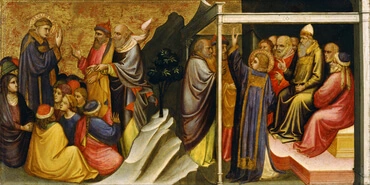God

When the Bible speaks of "Jehovah," it is representing love itself, the inmost love that is the essence of the Lord. That divine love is one, whole and complete in itself, and Jehovah also is one, a name applied only to the Lord. The divine love expresses itself in the form of wisdom. Love, then, is the essence of God -- His inmost. Wisdom -- the loving understanding of how to put love into action -- is slightly more external, giving love a way to express itself. Wisdom, however, is expressed in a great variety of thoughts and ideas, what the Writings collectively call divine truth. There are also many imaginary gods, and sometimes angels and people can be called gods (the Lord said Moses would be as a god to Aaron). So when the Bible calls the Lord "God," it is in most cases referring to divine truth. In other cases, "God" has reference to what is called the divine human. The case there is this: As human beings, we cannot engage the Lord directly as divine love. It is too powerful and too pure. Instead, we have to approach Him by understanding Him through divine truth. Divine truth, then, is the Lord in human form, a form we can approach and understand. Thus "God" is also used in reference to this human aspect, because it is an expression of truth.
This video is a product of the New Christian Bible Study Corporation. Follow this link for more information and more explanations - text, pictures, audio files, and videos: www.newchristianbiblestudy.org
This video is a product of the New Christian Bible Study Corporation. Follow this link for more information and more explanations - text, pictures, audio files, and videos: www.newchristianbiblestudy.org
Starší

Starší jsou v Bibli zmiňováni hlavně dvěma způsoby: Zaprvé staršími Izraele: a zadruhé 24 starších sedících kolem Božího trůnu ve Zjevení. V obou případech znamenají moudrost, která vychází z používání pravd, které jsme se naučili dělat, co je správné v našem každodenním životě. Starší Izraele znamenají hlavní věci moudrosti v církvi zvané Izrael. Starší zmínění ve Zjevení 4 znamenají moudrost nejvyšších nebes a rozšířením celé nebesa. Jako většina významů v Bibli, i toto se může v závislosti na kontextu změnit na význam převrácený do opaku. Místo mysli plné znalostí a lásky k bližnímu může být láska zkroucena, aby se pyšnila svou vlastní inteligencí a vedla ke zlu místo dobra. Starší a hlavní kněží, kteří seděli na soudu nad Ježíšem v Kaifášově domě, ukazují druhou stranu znázornění.








